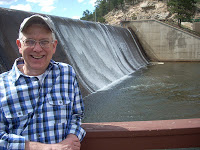I saw that today’s topic was actually Dancing with the Stars. I am aware that this is the name of a long-standing television series of the same name that I think involves teams of contestants in competitive-dancing with often B-grade celebrities. And I must admit I have never watched a single minute of this show and I mean no offense to anyone who enjoys it. Really how can somewhat like me who is addicted to reruns of The Big Bang Theory and the Golden Girls throw shade at anyone else’s TV viewing habits?
I could I suppose make a big stretch and turn ‘dancing with the stars’ into a metaphor for one of my past particularly enjoyable LSD adventures but instead I’ll write a few lines on last week’s topic: My First GLBT Acquaintance. Let me say right out of the box I have no idea who my first real GLBT acquaintance was since like all of us of a certain age I was birthed into the stifling cauldron of a falsely presumed heterosexual universe. We were in many ways unrecognizable to one another until we demanded to be called by our real names. A nearly universal experience we all relate to was the question of whether or not we were alone asking “am I the only one who is this way”. Our first acquaintance would I hope for most of us be a glorious answer to that question.
As I was writing this and had Pandora playing in the background I was unaware of any tune until Lou Reed’s masterpiece Walk on the Wild Side just came on. Released in 1972 this opus chronicles the adventures of a cast of characters all headed to New York City and a ‘walk on the wild side’.
I would take the liberty to say that through transexuality, drug use, male prostitution and oral sex they may have all been looking for and perhaps found that first GLBT acquaintance. Holly, Candy, Little Joe, Sugar Plum Fairy and Jackie all seem to have been based on real people from Reed’s life in NYC back then. All of whom I would say were very queer people.
We were fortunate in this SAGE Story Telling Group to get a glimpse of this albeit dangerous but deliciously exciting world Reed describes in his song through the frequent writings of a dear friend who died recently. As he related to us on several occasions his walks on the wild side started in the tearooms of downtown Denver department stores but would eventually be played out most emphatically on the streets of NYC. He often honestly provided glimpses into this world, that like it or not, is an integral part of our collective and frequently personal queer history. Thank you, dear friend!
For the sake of this piece I am going to say that “acquaintance” implies a mutual recognition that we are both queer as three-dollar bills. When using this definition the task of identifying my first acquaintance is much easier. This first person I suppose also represents my own personal “walk on the wild side”. As I have written about on previous occasions this ‘acquaintance” was a man 20 years my senior who I had been passive-aggressively courting for a year. We took a real ‘walk on the wild side’ and had sex (my first!) in the biology lab of my Catholic High School festooned with crucifixes on the wall. It was Easter week and I was a soon to graduate Senior. I am eternally in debt to this man for launching in very loving fashion my great ongoing gay adventure.
If there has been one thing that our liberation efforts the past century have provided it is that many but certainly not all new ‘recruits’ to the queer world do not have to have that first acquaintance involve a ‘walk on the wild side’. The fruits of success I suppose though work remains to be done and for some us perhaps a sense of nostalgia for a long gone but often very exciting times.
© July 2017
About the Author
I was born in La Porte, Indiana in 1949, raised on a farm and schooled by Holy Cross nuns. The bulk of my adult life, some 40 plus years, was spent in Denver, Colorado as a nurse, gardener and gay/AIDS activist. I have currently returned to Denver after an extended sabbatical in San Francisco, California.

